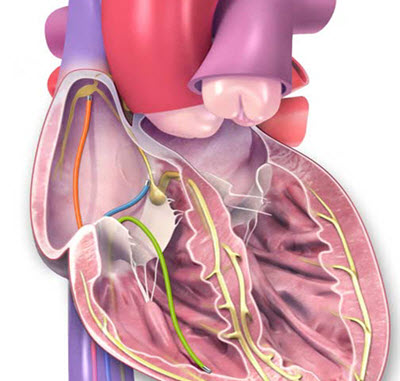Procedures
Electrophysiology Study and Catheter Ablation
Electrophysiology Studies
Electrophysiology (EP) studies assess your heart’s electrical function and determine whether you’re at risk of developing rapid or slow heart rhythms that may require specific treatment.
During the EP study, thin electrical wires are inserted into your heart through peripheral veins. These wires will trigger an arrhythmia, allowing us to identify any “short circuits” or “focal sources” within your heart chambers. This information helps us determine the most appropriate treatment plan for you.
Cardiac Ablation
Cardiac ablation is an important advancement in the treatment of cardiac arrhythmias. Once a diagnosis of your heart rhythm abnormalities has been made, catheter ablation is a widely used procedure for patients who desire a cure of their arrhythmia rather than taking medications.
In this minimally invasive procedure, heat or cold energy is used to destroy small areas of heart tissue responsible for causing arrhythmias. By doing so, your heart’s normal rhythm is restored and symptoms are reduced or eliminated.
In our practice, these procedures will be performed and reported by A/Professor William Chik, who is a highly experienced Electrophysiologist, accredited at Westmead Public and Private Hospitals, Macquarie University Hospital and the Mater-Hospital.

Call for Appointment
(02) 9646 4044
Procedures Expertise
Coronary Angiography & Stenting
Everything you need to know about
Electrophysiology Studies and
Catheter Ablation
What happens during an EP study?
During the EP study, thin electrical wires are inserted into your heart through peripheral veins. These wires will trigger an arrhythmia, allowing us to identify any “short circuits” or “focal sources” within your heart chambers. This information helps us determine the most appropriate treatment plan for you.
Is Catheter Ablation a safe procedure?
Yes, Catheter Ablation is a safe and effective procedure when performed by a skilled medical team with the appropriate experience and training.
What are the benefits of Catheter Ablation?
Catheter Ablation can provide long-term relief from arrhythmias and their associated symptoms. .
What should I expect after Catheter Ablation?
After Catheter Ablation, you may experience some minor discomfort, swelling, or bruising at the insertion site. You may also be prescribed medication to manage any discomfort or prevent blood clots. Your medical team will provide you with specific instructions on how to care for yourself after the procedure.
What are the risks?
As with any medical procedure, there are risks associated with these procedures. Your doctor from the Auburn Cardiology team will discuss the risks and benefits of undergoing this procedure prior to scheduling your procedure.
What is the expected duration of the procedure?
Typically, the procedure lasts between 2-4 hours, which may vary depending on the complexity of the issue being addressed. After the procedure, patients are usually required to stay overnight in the hospital.
How long does it take to recover from Catheter Ablation?
Recovery time varies from patient to patient. Most patients can return to their normal activities within a few days to a week after the procedure. Your medical team will provide you with specific instructions on how to care for yourself during the recovery period.
Call for Appointment
(02) 9646 4044
Procedures Expertise
Coronary Angiography & Stenting
Book an Appointment
Call for appointment/GP referral
(02) 9646 4044
